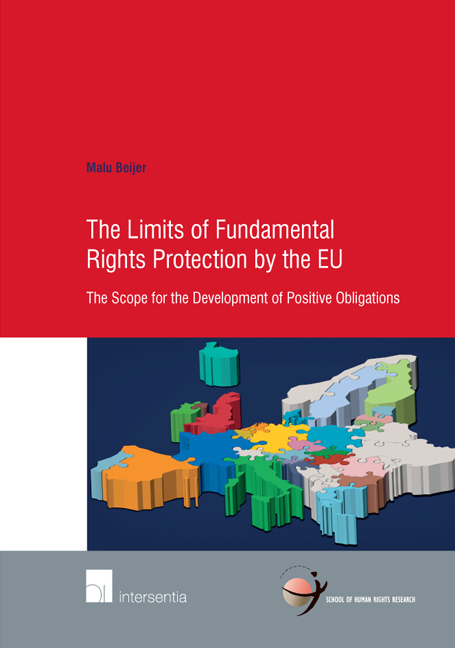 Limits of Fundamental Rights Protection by the EU
Limits of Fundamental Rights Protection by the EU Book contents
- Frontmatter
- About the Author
- Acknowledgements
- Contents
- Abbreviations
- Table of Cases
- Chapter 1 Introduction
- PART I THE CONCEPT OF POSITIVE OBLIGATIONS WITHIN THE CONTEXT OF THE EUROPEAN CONVENTION ON HUMAN RIGHTS
- PART II THE SCOPE FOR THE DEVELOPMENT OF POSITIVE OBLIGATIONS WITHIN THE CONTEXT OF EU LAW – AN ANALYSIS OF THE SPECIFIC PARAMETERS OF THE EU LEGAL ORDER AND THE EU SYSTEM OF FUNDAMENTAL RIGHTS PROTECTION
- Chapter 6 Main Principles of the EU System of Fundamental Rights Protection
- Chapter 7 The Institutional Characteristics and Judicial Culture of the ECJ
- Chapter 8 EU Competences and Subsidiarity in Fundamental Rights Protection
- Chapter 9 The Limited Scope of Application of EU Fundamental Rights
- Chapter 10 Part II – Conclusions
- PART III SYNTHESIS
- Bibliography
- Index
- Miscellaneous Endmatter
Chapter 10 - Part II – Conclusions
from PART II - THE SCOPE FOR THE DEVELOPMENT OF POSITIVE OBLIGATIONS WITHIN THE CONTEXT OF EU LAW – AN ANALYSIS OF THE SPECIFIC PARAMETERS OF THE EU LEGAL ORDER AND THE EU SYSTEM OF FUNDAMENTAL RIGHTS PROTECTION
Published online by Cambridge University Press: 27 September 2018
- Frontmatter
- About the Author
- Acknowledgements
- Contents
- Abbreviations
- Table of Cases
- Chapter 1 Introduction
- PART I THE CONCEPT OF POSITIVE OBLIGATIONS WITHIN THE CONTEXT OF THE EUROPEAN CONVENTION ON HUMAN RIGHTS
- PART II THE SCOPE FOR THE DEVELOPMENT OF POSITIVE OBLIGATIONS WITHIN THE CONTEXT OF EU LAW – AN ANALYSIS OF THE SPECIFIC PARAMETERS OF THE EU LEGAL ORDER AND THE EU SYSTEM OF FUNDAMENTAL RIGHTS PROTECTION
- Chapter 6 Main Principles of the EU System of Fundamental Rights Protection
- Chapter 7 The Institutional Characteristics and Judicial Culture of the ECJ
- Chapter 8 EU Competences and Subsidiarity in Fundamental Rights Protection
- Chapter 9 The Limited Scope of Application of EU Fundamental Rights
- Chapter 10 Part II – Conclusions
- PART III SYNTHESIS
- Bibliography
- Index
- Miscellaneous Endmatter
Summary
THE SPECIFIC PARAMETERS OF EU LAW DEFINING THE SCOPE AND THE LIMITS FOR THE DEVELOPMENT OF POSITIVE OBLIGATIONS
In this chapter, the main findings of the analysis undertaken in part II are presented. This part has studied the specific system of fundamental rights protection in the EU to find out whether it allows for any development of positive obligations by the ECJ. The Charter provides some potential for the recognition of positive obligations. It contains a great variety of fundamental rights which could require active measures to be taken by the EU institutions as well as by the member states. The Charter also, however, lays down some important conditions for protecting such fundamental rights in the EU context. It determines inter alia that the Charter only applies to the actions of the EU institutions and the member states in so far as they are implementing EU law. This important condition necessarily limits the scope for a development of positive obligations. However, as has also been explained, it does not exclude such development altogether. There are various other conditions that can be expected to be of influence in the development of positive obligations in the context of EU law.
In this chapter, it is first of all explained that the use of the preliminary reference procedure plays an important role in the (potential) development of positive obligations by the ECJ (section 10.2.). Aft er that, the main relevant legal bases for a development of positive obligations on the basis of EU law are indicated (section 10.3.). Then it is explained how the limited competences of the EU, in combination with the limited scope of application of EU fundamental rights, can allow for the recognition of a concept of positive obligation by the ECJ, albeit to a limited extent (section 10.4.). In this section in particular, the conclusions following from chapters 8 and 9 are drawn together. Lastly, a few other, more specific factors that can influence the degree to which the ECJ could be expected to further develop positive obligations in its case-law are addressed. These mainly concern the specific institutional position of the ECJ and the role it can be expected to play in protecting fundamental rights (section 10.5.).
- Type
- Chapter
- Information
- Limits of Fundamental Rights Protection by the EUThe Scope for the Development of Positive Obligations, pp. 247 - 260Publisher: IntersentiaPrint publication year: 2017


